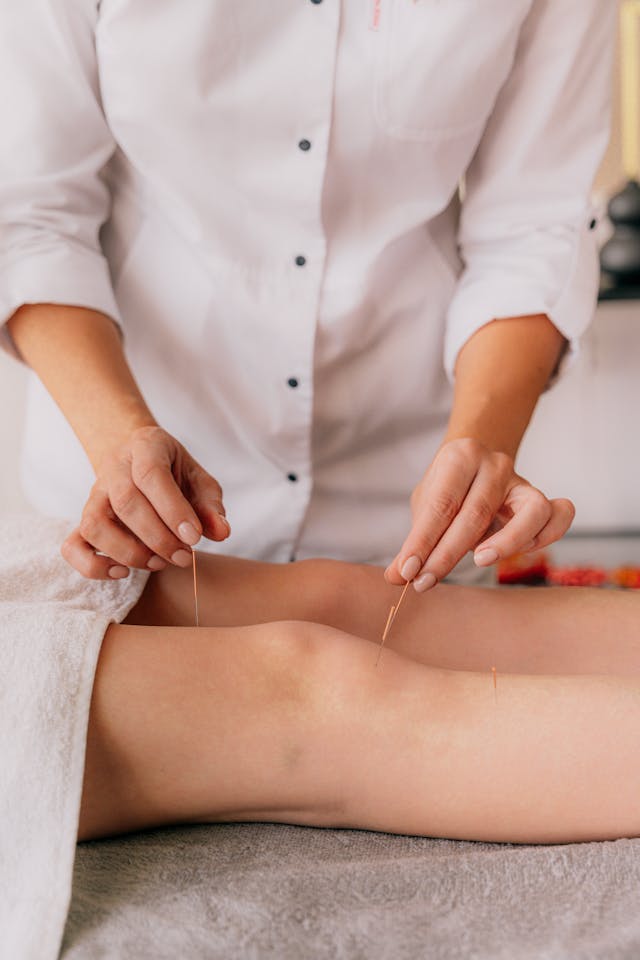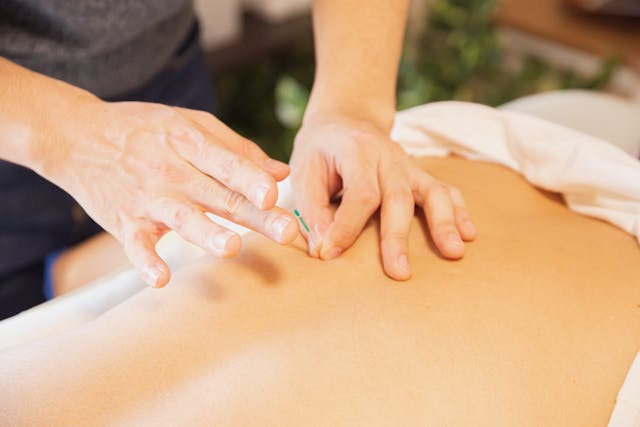When managing pain tension, or improving overall well-being, two prominent therapies often come to mind: dry needling and acupuncture. Both involve fine needles, but the differences between these two techniques are significant.
This guide explores the difference between dry needling and acupuncture and their respective benefits, risks, and considerations to help you make an informed choice. If you need help determining which therapy suits your needs, consider contacting a professional from our Mobile Physiotherapy Services for personalised guidance.
What Is Dry Needling?
Dry needling is a modern therapeutic technique grounded in Western medicine. It involves inserting thin needles into myofascial trigger points—called “knots”—to release muscle tightness, relieve pain, and restore function. Unlike acupuncture, dry needling primarily targets musculoskeletal pain and improves mobility.
This therapy is commonly used by physiotherapists in Sydney and Melbourne to address issues such as:
- Muscle stiffness and spasms
- Sports injuries
- Sciatica
Dry needling therapy stimulates a local twitch response in the muscle, which can help reduce tension, increase blood flow, and accelerate recovery. The treatment offers relatively quick results, and patients may experience significant relief even after just one session. Contact us for a consultation on whether this treatment suits your condition.
What Is Acupuncture?
Acupuncture, on the other hand, is a component of Traditional Chinese Medicine (TCM). This ancient practice involves inserting needles into specific points on the body called meridians to balance the body’s energy flow or Qi. Acupuncture is used for many conditions and is not limited to pain relief.
In addition to its pain-relieving properties, acupuncture benefits include promoting relaxation, improving digestion, and reducing anxiety. Many people turn to acupuncture for its holistic approach, which addresses the body, mind, and spirit as a unified whole.
Key Differences Between Dry Needling and Acupuncture
While both therapies involve needles, the difference between dry needling and acupuncture is rooted in their underlying philosophies and methods.
- Philosophy: Acupuncture is based on traditional Chinese medicine and aims to balance Qi, whereas dry needling stems from Western medical practices, focusing on musculoskeletal pain.
- Technique: Acupuncture targets meridians, or energy channels, while dry needling focuses on muscle trigger points.
- Purpose: The goal of acupuncture is to restore the body’s natural energy balance while dry needling relieves tension and pain in affected muscles.
In short, while both therapies offer effective pain relief, their approaches are vastly different. If you’re wondering, is dry needling and acupuncture the same?, the answer is no.
Benefits of Dry Needling
One critical advantage of dry needling is its effectiveness in treating musculoskeletal issues. This therapy can benefit athletes recovering from injuries or people suffering from chronic back pain.
Some of the significant dry needling benefits include:
- Pain relief: Dry needling directly targets pain by addressing the root cause—tight, knotted muscles.
- Increased range of motion: Dry needling improves mobility and function by releasing muscle tension.
- Quick results: Unlike some therapies that may take time to show effects, dry needling often provides relief in just a few sessions, if not after the first.
Benefits of Acupuncture

The benefits of acupuncture extend far beyond just pain relief. Acupuncture is known for its ability to treat a range of conditions while promoting holistic well-being. Some key benefits include:
- Stress reduction: Acupuncture promotes relaxation, helping reduce stress and anxiety.
- Versatile treatment: It can address not only physical pain but also conditions such as insomnia, digestive problems, and hormonal imbalances.
- Holistic health improvement: Acupuncture stimulates the body’s natural healing processes, enhancing overall wellness and balance.
Acupuncture is particularly beneficial for those seeking a more holistic, whole-body approach to healing.
Risks and Side Effects of Dry Needling and Acupuncture
Both dry needling and acupuncture are considered safe when performed by trained professionals. However, as with any treatment, there are some potential risks and side effects.
| Therapy | Risks & Side Effects |
| Dry Needling | – Bruising at the needle site – Temporary soreness – Infection (rare) |
| Acupuncture | – Slight bleeding or bruising – Temporary soreness – Dizziness (rare) |
To minimise these risks, seeking treatment from certified practitioners who follow proper hygiene and safety protocols is crucial. At Healthproof, all our mobile physiotherapists are fully trained and certified, ensuring your treatments are safe and effective.
Which Is Better for Sciatica: Acupuncture or Dry Needling?
If you’re suffering from sciatica, choosing between acupuncture and dry needling can depend on several factors, including the severity of your symptoms and personal preferences.
- Acupuncture for sciatica restores the energy flow along the affected meridian, which can help alleviate pain and inflammation.
- Dry needling for sciatica focuses on releasing muscle tightness and reducing pressure on the sciatic nerve, often providing faster relief for acute pain.
Both therapies can be effective when choosing which is better for sciatica, acupuncture or dry needling. However, dry needling may be the better option if you’re looking for quicker, more targeted relief. Acupuncture, meanwhile, offers a more comprehensive, long-term approach to overall well-being.
Conclusion: Which Therapy Should You Choose?
There is no one-size-fits-all answer in the debate about dry needling vs. acupuncture. Both therapies have strengths, and the best choice depends on your condition and health goals.
If you’re dealing with muscle pain, stiffness, or sports injuries, dry needling might provide faster relief and help you get back to your routine quickly. However, if you’re seeking a holistic, long-term solution for pain or other health issues, acupuncture may offer the well-rounded treatment you need.
Consult a healthcare professional to determine which therapy is best suited for you. At Healthproof, our team of skilled mobile physiotherapists is ready to help you on your journey to recovery, offering personalised care across Sydney and Melbourne.
If you’re still unsure about the difference between acupuncture and dry needling or need help deciding between the two therapies, feel free to contact us or explore our Mobile Physiotherapy Services to learn more.

